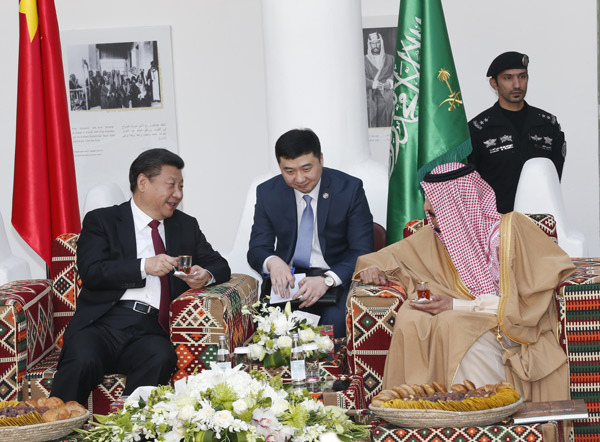Focus of Xi's trip dialogue and development
By Li Shaoxian (China Daily) Updated: 2016-01-25 08:04
 |
|
Chinese President Xi Jinping (L) and Saudi King Salman bin Abdulaziz Al Saud (R front) taste traditional Arab coffee during his visit to the Murabba' Palace, named after its square form of 400 by 400 meters in Riyadh, Saudi Arabia, Jan 20, 2016. [Photo/Xinhua] |
Chinese President Xi Jinping concluded his fruitful visit to Saudi Arabia, Egypt, and Iran over the weekend, his first diplomatic tour to the Middle East region since fully assuming office in 2013. It ushered in a new era, featuring comprehensive, long-term and stable development, for the bilateral partnership.
In general, Xi's three-nation Middle East tour has brought China comprehensive deepened relations with the three countries, taking ties to new heights.
Xi and Saudi Arabia's King Salman bin Abdulaziz Al Saud witnessed the signing of a memorandum of understanding on advancing the Belt and Road Initiative and production capacity cooperation, as well as other agreements on energy, telecommunication and aviation. The two countries also released a joint statement on forming a comprehensive strategic partnership.
In shared pursuit of enhancing the comprehensive strategic partnership they forged in 2014, China and Egypt signed 21 cooperation agreements on Thursday and endorsed a five-year plan pledging to co-build the Belt and Road Initiative.
Xi also brought fresh impetus to the China-proposed trans-Eurasia initiative, in which Iran has the potential to serve as a Middle East bridgehead, thanks to its pivotal geopolitical location and relative stability.
Major breakthroughs are foreseeable in the trade and people-to-people exchanges and energy-oriented cooperation between the two countries, given that the international sanctions on Iran have been lifted and the country craves economic boosters. In particular, with the help of Chinese-funded infrastructure, both nations will enjoy a high level of interconnectivity in the years to come.
The biggest highlight of all is the trip signaled Beijing is putting more concrete efforts into realizing both the Silk Road Economic Belt and the 21st Century Maritime Silk Road, in a bid to better interconnect with the Middle East.
China will provide a total of $55 billion loan to the Middle East, including $15 billion special loan for industrialization and $10 billion of commercial loans to support production capacity cooperation, and $10 billion preferential loan to the region. It also includes a $20 billion joint investment fund with the United Arab Emirates and Qatar to invest in traditional energy, infrastructure development and high-end manufacturing industries in the region.

I’ve lived in China for quite a considerable time including my graduate school years, travelled and worked in a few cities and still choose my destination taking into consideration the density of smog or PM2.5 particulate matter in the region.











